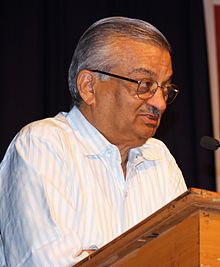Anil Kakodkar
| Anil Kakodkar अनिल काकोडकर |
|
|---|---|
 |
|
| Born |
11 November 1943 Barwani, India |
| Residence | Mumbai, India |
| Nationality | Indian |
| Fields | Mechanical Engineering |
| Institutions |
Atomic Energy Commission of India Department of Atomic Energy Bhabha Atomic Research Centre (BARC) |
| Alma mater |
Ruparel College VJTI, University of Mumbai University of Nottingham |
| Known for |
Smiling Buddha Pokhran-II Indian nuclear program |
| Notable awards |
Padma Shri (1998) Padma Bhushan (1999) Padma Vibhushan (2009) |
Anil Kakodkar (Marathi: अनिल काकोडकर; born 11 November 1943) is an Indian nuclear scientist and mechanical engineer. He was the chairman of the Atomic Energy Commission of India and the Secretary to the Government of India, he was the Director of the Bhabha Atomic Research Centre, Trombay from 1996–2000. He was awarded the Padma Vibhushan, India's second highest civilian honour, on 26 January 2009.
Apart from playing a major role in India's nuclear tests asserting sovereignty, Kakodkar champions India's self-reliance on thorium as a fuel for nuclear energy.
Kakodkar was born in 1943 (11 November 1943), in Barwani princely state (present day Madhya Pradesh state) to Kamala Kakodkar and Purushottam Kakodkar, both Gandhian freedom fighters. He had his early education at Barwani and at Khargone, until moving to Mumbai for post-matriculation studies.
Kakodkar graduated from Ruparel College, then from VJTI, University of Mumbai with a degree in Mechanical Engineering in 1963. He joined the Bhabha Atomic Research Centre (BARC) in 1964. He obtained a master's degree in experimental stress analysis from the University of Nottingham in 1969.
He joined the Reactor Engineering Division of the BARC and played a key role in design and construction of the Dhruva reactor, a completely original but high-tech project. He was a part of the core team of architects of India's Peaceful Nuclear Tests in 1974 and 1998. Further he has led the indigenous development in India's Pressurised Heavy Water Reactor Technology. He worked in the rehabilitation of the two reactors at Kalpakkam and the first unit at Rawatbhata, which at one stage were on the verge of being written off.
...
Wikipedia
